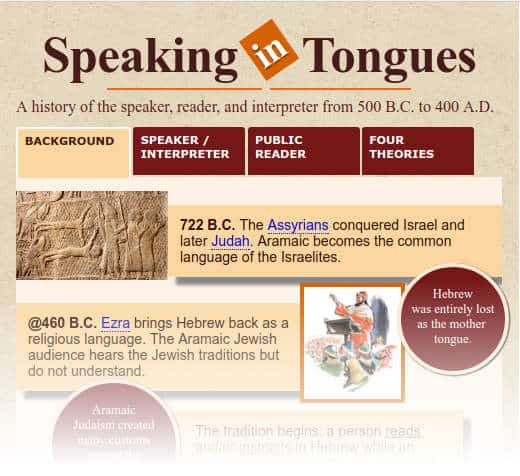A history of speaking, interpreting, and reading from 500 B.C. to 400 A.D. in Judaism and early Christianity.
An interactive infographic to help you navigate Paul’s world and how these offices later evolved in the Christian Church. Clicking on the image will bring you to the full interactive site.
IMPORTANT! Please note that the interactive file was an experiment in coding and design. The end result is that you have to wait a bit longer before the file is rendered, especially on mobile phones. My apologies in advance.
Paul’s mention of speaking in tongues in I Corinthians is deeply wrapped in the Jewish identity. The same goes for his understanding of speaking, reading, and interpreting of tongues. These rites have a rich history that goes well over 800 years. The initial origins are deeply connected to the times of Ezra.
Here is the link to the Corinthian Tongues Infographic if clicking the image does not work.
The reference to speaking and interpreting in Paul’s first letter to the Corinthians is entirely distinct from the miracle of Pentecost—for information about Pentecost see A History of Tongues in the Catholic Church and related articles found at the Gift of Tongues Project.
The customs of speaking, interpreting, and public reading are deeply embedded in Jewish tradition and inherited by the early church. Paul, if he was alive today, would be surprised at how the modern interpretations are so different than his intentions.

Excellent method! Interpretation while reading is very interesting! The Boer people (my people) during the Great Trek and numbers of people in later generations used to hold home services every evening, reading from Scripture, praying and singing. Part of this house church service was to ask the children what they have heard. So countless budding “theologians” were raised. They interpreted what they heard. Consequently, when the Boer camp was attacked by hordes of thousands of black people that surrounded them at Blood River, their faith was so strong that a few hundred men and women who were loading their guns, defeated the enemy – the nearby river was colored red in blood.
> There should be caution in your research against drifting into all kinds of interpretations of the phenomenon of tongues in a mechanistic manner, while excluding its true nature, which is Spiritual and a gift from God. The theological constellation of Expression Theology that I am developing, sheds much light on the theological justification for this phenomenon that is being administered by the Holy Spirit. The expression process is eternal. The lack of its prevalence in a part of the church is as a result of cerebral instead of Spiritual thinking. It should be discerned Spiritually, as Paul has directed. The study should be well balanced between the two poles.